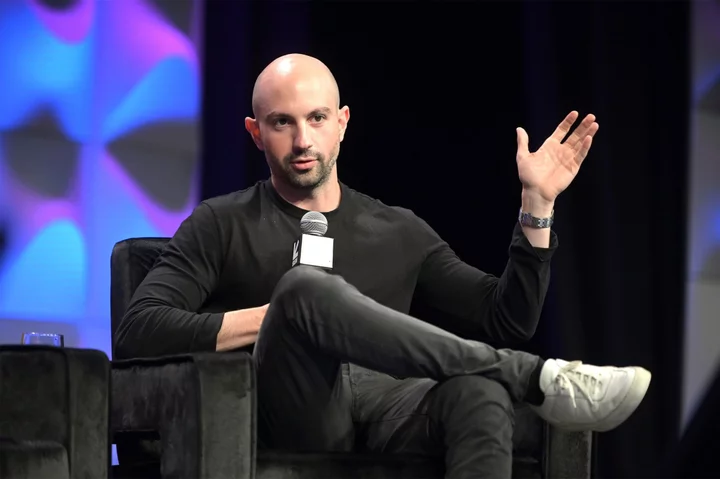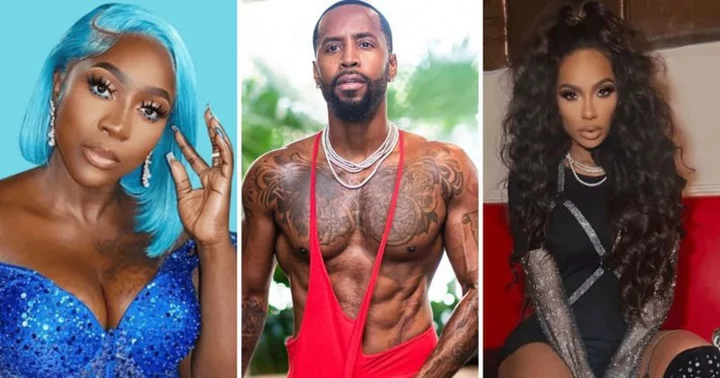In the fall of 2014, a young and largely unproven talent agent in Hollywood found himself listening intently to Serial, the breakout, true-crime podcast from This American Life. While the hit series left countless listeners questioning the myriad uncertainties of the criminal justice system, 20-something Oren Rosenbaum fixated, instead, on something else — a deep and universal enigma just then gaining currency. Was podcasting a good business?
Rosenbaum suspected it could be. After all, the show’s sponsor, Mailchimp, was thoroughly log jammed in his brain waves. Somebody, he thought, was getting paid something.
At the time, Rosenbaum was working on a minor league team at United Talent Agency, tasked with finding opportunities in emerging fields like virtual reality. Rosenbaum jumped on a call with Jeremy Zimmer, the chief executive officer of UTA, and pitched him on a wild notion. Podcasting was poised to be Hollywood’s next big thing.
“His reaction was kind of like, ‘Podcasting? Who’s going to f---ing listen to a podcast?’” Rosenbaum recalled recently. “‘Why do that instead of watching Netflix?’” Despite some initial doubts, Zimmer soon gave Rosenbaum his blessing.A decade later, podcasting has ballooned into a sprawling industry that generates nearly $2 billion a year in annual revenue — and Rosenbaum, 34, now the head of audio at UTA, sits in the middle of it. He controls a deep and enviable roster of well-known voices, including Ashley Flowers of Crime Junkie, Emma Chamberlain of Anything Goes and Alex Cooper of Call Her Daddy. And he has spent the past several years forging multimillion-dollar podcasting contracts on behalf of his clients with top audio platforms, which have collectively transformed a tweedy, cottage industry into a glittering hub of the entertainment world, overstuffed with famous comedians, technologists, lifestyle coaches, authors, politicians and athletes.
“The reason the medium has grown so fast is thanks to Oren,” said Conal Byrne, chief executive officer of iHeartMedia Inc.’s digital audio group. “Oren can retire one day knowing he had a material hand in building this entire industry beyond just the deals he did.”
But Rosenbaum’s legacy in podcasting is hardly written yet. Recently, the industry’s giddy gold rush era has given way to a new leaner and more anxious phase. In recent months, as richly compensated podcasters have struggled to live up to their lofty expectations, many high-profile series have been canceled. Networks have laid off employees, and advertisers have pulled back. Along the way, the prevailing happy-go-lucky vibe of the industry has turned markedly sour as everyone involved sifts through the mounting carnage, trying to figure out what went wrong and who is to blame.
Having helped pump up the podcast boom, Rosenbaum must now figure out what to do during its bitter deflation. While acknowledging the broader pullback, Rosenbaum said he’s hardly giving up on the mega deals.
“When we go to market with something, when we know it’s a big thing and successful from an audience standpoint, we are very aggressive,” Rosenbaum said. “In tough times, some of those deals that we were very aggressive with don’t end up being successful for the company that we’re making that deal with. My group and my aspect of the industry are not immune to that.”
Like a lot of people in the podcasting world, Rosenbaum’s original ambitions were much more focused on TV and film. Following high school in Princeton, New Jersey, Rosenbaum matriculated to the University of Southern California where he studied cinematic arts. After graduating, Rosenbaum landed a job as an assistant at the glossy Paradigm Talent Agency. Three years later, he jumped to UTA.
In retrospect, Rosenbaum’s pivot into podcasting in 2014 couldn’t have been better timed. In the wake of Serial, talented people from all walks of life were pouring into the field, hoping to voice the next great podcast. Rosenbaum had the pick of the litter.
Single, child-free and hungry to sign clients, Rosenbaum threw himself headlong into the nascent podcast circuit, flying from one podcasting convention to the next, watching the panel discussions, applauding the keynote speeches, mingling at the networking events and cozying up to the budding stars. For many podcasters, the idea that you could have a professional agent in your corner was still a mouth-watering novelty.
Before long, everyone in podcastland knew of Oren — no last name necessary. Bald headed and reliably dressed in black, he was low-key and ubiquitous, stolid yet playful. To this day, he likes to text using the invisible ink feature on iMessage to blur words until the receiver swipes on them. At parties, he slurped down carrot juice as he schmoozed.
While spending so much time on the road, he often forged close, personal relationships with his top clients. Guy Raz of How I Built This said he not only invited the agent to his son’s bar mitzvah, but asked him to participate. Rosenbaum opened the Torah ark and gave a blessing.
“He had a huge impact on my life,” Raz said. “He saw something in me I didn’t.”
Despite being surrounded at all times by garrulous storytellers, Ronsenbaum largely managed to stay out of the limelight. Reflexively private by nature, he’s happy to avoid microphones and let his professional yackers do the talking. His Instagram is set to private. For the most part, few people in the media outside of podcasting have heard of Rosenbaum. Only begrudgingly, after much prodding, did he agree to be interviewed for this story.
“I think of him as my rock,” said Aaron Mahnke, creator and host of Lore. “He’s just Oren, no spikes on the chart, just steady, which is what you want.”
Over the years, as the industry expanded, Rosenbaum’s deals kept escalating in value. In 2016, he sold Crimetown, a series from the creators of the hit HBO documentary The Jinx, to Gimlet Media for seven figures, a major milestone. “I was like, ‘I can’t believe this. We got a million dollars— it’s crazy,’” Rosenbaum said.
Paydays escalated from there. Spotify Technology SA was just beginning to invest heavily in original podcasts as a way of differentiating its slate of programming from other music streaming services. In 2018, Rosenbaum signed his client, comedian Amy Schumer, to one of Spotify’s first exclusive deals. In the years that followed, the platform would go on to spend over $1 billion on acquisitions and licenses.
As audio platforms vied for subscribers, Rosenbaum was there to supply talent to the likes of Amazon.com Inc., SiriusXM Holdings Inc., Audacy Inc. and iHeartMedia. Bidding wars ensued. Often, the buyers would justify the big deals with wildly optimistic forecasts for advertising, subscription and licensing revenue based on little more than highly speculative projections of potential download numbers. At UTA, Rosenbaum made partner.
Amid the bull market, Rosenbaum often pitched his clients on an alluring vision: they could not only anchor podcasts but build entire media empires. Alex Cooper of Call Her Daddy launched her own network, Unwell. Ashley Flowers of Crime Junkie expanded her media company, Audiochuck, to employ 40 people, encompassing film, TV and book publishing.
“The guy is just beating the pavement,” Flowers said. “He’s constantly talking to everyone.”
At first, the early days of the pandemic only added to the frenzy. When everything shut down, a bumper crop of celebrities with a sudden surplus of time on their hands, from Dua Lipa to Katy Perry to Meghan Markle to Lindsay Lohan, decided to become podcasters. But by 2021, as the pandemic restraints loosened and actors and athletes and musicians went back to work, a dispiriting realization was coming into view. A lot of the hyped-up celebrity shows were struggling to hit their targets. In September, Sony Group (a client of Rosenbaum’s) laid off staff in its podcast business and canceled a show anchored by author and model Emily Ratajkowski (also, a Rosenbaum client).
“Some of the most generous deals banked not just on shows being hits, but on the industry continuing to grow at a breakneck, ever-doubling pace,” said Lex Friedman, an independent industry consultant. “Obviously that bonkers explosiveness couldn’t last forever.”
Recently, a number of disputes over failed ventures have broken out and spilled into public, attracting sharper media scrutiny. Other prominent companies, like Audacy, prematurely exited contracts.
With so much drama in the air, keeping out of the spotlight will likely get that much harder for Rosenbaum as he and his colleagues and competitors try to navigate an industry increasingly riven by hard feelings. Already, several hosts have broken up with their business partners or switched agencies. These days, UTA is hardly the only game in town. Rivals Creative Artists Agency and Endeavor Group Holdings Inc. both operate teams dedicated to podcasting. In recent months, multiple podcasting clients have dropped UTA, including Mythical Entertainment. People familiar with some of these moves say creators have left over a range of frustrations, including over complaints that Rosenbaum is stretched too thin to give much personal attention to anyone but his top clients.
Despite Rosenbaum’s efforts to maintain a low profile, not long ago, his relationship with a younger colleague at UTA became a subject of a sorrowful podcast by the woman’s lovesick former boyfriend — a workplace power dynamic that did not sit well with one of Rosenbaum’s clients. “I would never want my brand and my ethics to be associated with that kind of behavior,” said Tiffany Reese, host of Something Was Wrong, who left UTA as a result.
“The consensual relationship was appropriately disclosed,” said a UTA spokesperson over email.
During the pandemic, to be closer to his aging mother, Rosenbaum moved from Los Angeles to Miami where he now lives while continuing to spend much of his time on the road. At UTA, he oversees a team of 13 employees, including eight agents in the US and UK.
Throughout the boom, UTA maintained investments in several podcast businesses, including Sonoro Media, a content network focused on Spanish-language shows, and Dear Media, a female-focused network. In the face of the industry’s current struggles, the agency continues to invest. In August, it funded Starglow Media, a podcast service for kids started by a former UTA agent from Rosenbaum’s team.
Quinn Heraty, an attorney and principal at Heraty Law, a firm that specializes in the media industry, said that such arrangements in which agencies simultaneously represent podcasters and production firms tend to look just fine during boom years when everyone is feeling good, while often resulting in uncomfortable entanglements during more acrimonious periods of contraction.
“I don’t think conflicts of interest are disclosed well enough to the clients,” Heraty said, speaking generally about agencies as a whole.
Rosenbaum said that nobody at UTA is giving up on podcasting. The problems with advertising will be sorted out, he said. Updated ad technology and transparency around data will encourage more brands to pay to appear on shows. In 2016, 21% of the US population listened to at least one episode monthly. Now, 42% do so. Audiences, Rosenbaum said, will keep expanding. More big deals will surface as podcasters command larger, more rabid fan bases.
“It’s continuously growing,” Rosenbaum said. “And we’re not seeing anything to indicate otherwise”









